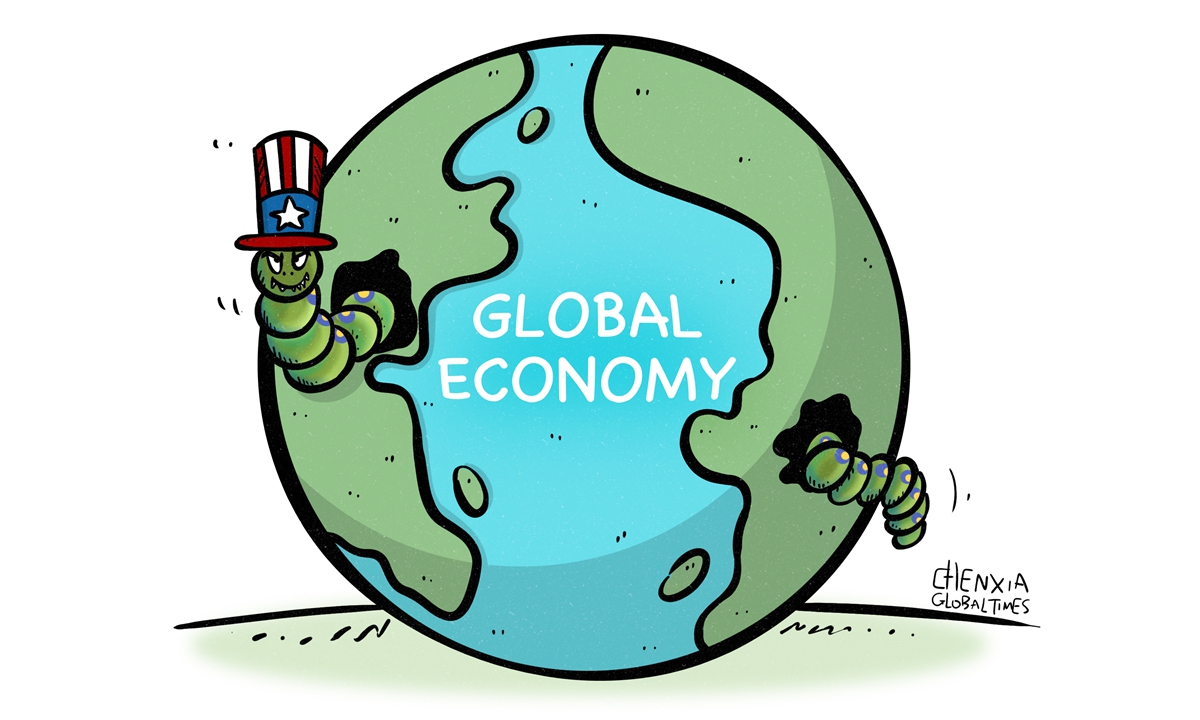
Illustration: Chen Xia/Global Times
International crude oil price continued to drop on Monday, with US' West Texas Intermediate oil futures slipping to $86.82 a barrel, its lowest level since early February just before the outbreak of Russia-Ukraine conflict. However, the Washington Post said "China's surprise rate cut, economic slowdown send oil prices plunging."As the world's largest oil importer consuming 15 percent of the world's oil, China's demand fluctuations have a certain impact on oil prices, but the severe turbulence in oil prices this year is more of the consequence of a series of complicated factors including geopolitical conflicts, the US-led economic sanctions against Russia, weak economic performance in Europe and the US, as well as the irregular movement of the US dollar.
After China released its economic data for July on Monday, some Western media outlets launched another round of badmouthing targeting China's economy, trying to blame the pressure on the global gloom and the decline of oil prices on China, which has long been a stabilizer and a major contributor of economic growth.
It is of outright nonsense to use a decline in oil prices to slander China's economy. The Chinese economy has maintained strong growth rates for many years, and after the central bank cut interest rates to propel quick growth after the pandemic hit, the economy has been reignited.
Admittedly, some indicators showed that the slower-than-expected pace of expansion in certain areas in China's economy last month suggested headwinds linked to global uncertainty and sporadic COVID-19 flare-ups. When looking at China's economic outlook, the outside world should return to gauging the fundamentals, which remains solid.
Now the international oil prices are returning to the level of months ago, which is definitely conducive to growth of China's economy in the second half of the year. Analysts said that low oil prices will help China's manufacturing industry to reduce costs and improve profit margins, and it will also have a positive stimulating effect on demand for consumption and tourism.
In contrast, the bleak US economy and the deep-rooted dilemma of US central bank' macroeconomic policy is shadowing the global economy, which should arouse more concern.
The US economy contracted in the first and second quarters of 2022, fueling an ongoing debate about whether the country is already in or about to slip into a recession. An increasing number of investors believe that the US has entered a recession, and the dilemma between the Fed's response to deal with inflation and recession is for everyone to see.
Though Western think tanks are vigorously defending the US economy, claiming it is unlikely to have a hard landing and there are still reasons to be optimistic, it is undeniable that the US economy and the country's irresponsible macro policies are the biggest risk to the global economy.
More significantly, given the important position of the US economy and the dollar in the global economic and financial system, once the US economy falls into recession, it will create negative spillover effects and dampen the global economic outlook.
As the most important commodity in the world, the oil price is not only an important indicator for the financial market, but also has a certain influence on the future direction of the global economy. While there is no easy answer to the question of how a fall in oil prices will affect the world economy, if the oil supply and demand balance cannot be restored and prices cannot stabilize, it will continue to shortcut the global economy.
The International Monetary Fund in late July downgraded the global economic growth forecast to 2.3 percent. Facing an increasing uncertain future, all major economies should take a responsible attitude and work together to shore up the global economy instead of playing geopolitical games and intentionally erecting more barriers to harm cooperation.
The author is an editor with the Global Times. bizopinion@globaltimes.com.cn



